
It is only appropriate that on this “Darwin Day” we cut into Evolution wholeheartedly beginning with Charles Darwin. Yes above is a big picture of a younger Charles, a big picture because for the theory of Evolution, Darwin is a big man. While newer adherents tend to vary in the type of evolution they embrace, for most of its existence the Theory of Evolution has been considered based on, or synonymous with, Darwinism. While we will not perform a full dissection in detail, I am hopeful our glance at the work of Darwin will reveal enough of his theory for us to understand where the current predominant scientific belief about the origin of Man has its foundations.
Charles Darwin (1809-1882) was a naturalist from England, meaning he studied plants and animals, their interactions and changes. His book On the Origin of Species By Means of Natural Selection or The Preservation of Favoured Races in the Struggle For Life is his greatest work, widely lauded as an example of genius, and is the basis for the Theory of Evolution. It should be noted that in the book’s 6th edition the title was officially shortened, perhaps misleadingly, to The Origin of Species.
The hypothesis put forth in this work, which Darwin was inspired to write as a result of his five-year trip on the HMS Beagle to the Galapagos and other islands where he saw animal species and fossils that he had never before seen, is that all species of life evolved from common ancestors. This happens, he says in that work, by a process of natural selection, whereby beneficial traits are passed down from one generation to the next, and undesirable traits are slowly phased out. This is the process that has come to be termed “survival of the fittest“.
This “survival of the fittest” idea needs some elaborating because opponents of Evolution (capital E signifying the macroevolution Theory rather than the microevolution process) often misunderstand it. It does not mean that the strong of the plant and animal kingdoms take over the weak, nor does it mean that human beings do or should eliminate (consciously or not…) lesser men. The statement “survival of the fittest” is not an ethical proscription, it is rather an observation, and signifies only that the “strong” varieties, meaning those creatures which are possessed of the most beneficial traits given their immediate environment, survive, while those without, die out.
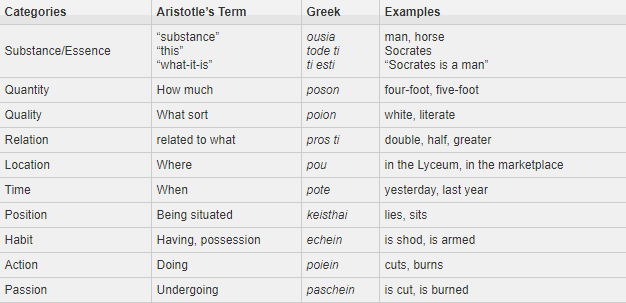
Some Background: The Unity of All Life, and Aristotle’ Categories
Darwin’s theory, it is said, “…established evolutionary descent with modification as the dominant scientific explanation of diversification in nature”. What this means is that Darwin established a way whereby ALL the creatures and plants of the world, all living things and every member of the chain of being, can be seen as related one to another. This is very important for a proper understanding of Darwinism from an historical perspective because of its relationship to Aristotle’s Genera of Being and, more specifically, his Categories.
It is important to remember that being a Platonist at heart Aristotle’s logic and and even his biology are not concerned necessarily with the subjects themselves, such as this lion or that orchid, but rather with the forms or ideas of these things. Consequently, his Categories are not about formal being (ousia; to on) per se, they are actually about the ways we may properly speak of these things. His Categories and his Genera of Being, they are meant to be guidelines for discussions about any subject (ousia). To understand what follows you need comprehend that according to Aristotle this subject, this ousia, cannot be predicated of anything, not even other ousia. We may say this lion is fierce or that orchid is robust, but we cannot say X (meaning anything) is a lion, or X is an orchid. The best you can do is say “a lion is a lion” which is called a tautology and says absolutely nothing at all about the lion.
The Categories, a necessary prerequisite for proper explication and understanding of the rest of his philosophy such as his De Anima and his Metaphysics, may be legitimately summarized as stating that all the objects of Man’s perception or contemplation—any object of consciousness—can be spoken of in only ten basic ways. The Categories are to the way we speak about things what the Genera of Being (scientific classification) is to the ways we classify things. An understanding of the ways we may logically and reasonably have a conversation, whether acquired intuitively or by training, is a necessity for evaluating any complex ideas and deciphering any communication, and so is a prerequisite for any meaningful thought. When he established the Categories he set the table for the meal that is the Aristotelian system, and to large extent, he served the requirements for the nourishment known as Science.

These Categories are as follows, elaborating a bit on the simple chart I have posted a few paragraphs up; I include an example for each, and keep in mind that every Substance should be placed in only one Category at a time:
1. Substance—the most controversial and misunderstood category, I will spend a bit more time on it than the rest. The words he used are ousia or some version of to on, and perhaps “Substance” in this day and age is a bad translation. Substance is, quite simply, anything that exists in and of itself, and which has qualities. It is an idea (idea) of/or a form (eidos).
While all the other categories say something about Substance (ousia), nothing can ever be predicated by Substance. This is what we talk about, it is our object or issue, let’s say “X”. “X is a lion” or “X is an orchid” would be incomprehensible, because we would be trying to describe one Substance – which you can think of in the English grammar as the “subject” of a sentence – in terms of another. He also divides these subjects into primary and secondary types, so “lion” would be the primary sort while “animal” or “mammal” would be secondary. You or I individually would be primary, while “Man” or “Human Beings” secondary.
The controversy occurs because more recent scientists, specifically Evolutionists, have refused to admit that a subject (the lion or the orchid…or you) can be anything more than the sum total of the things which may be said about it. They have all but eliminated the thing-in-itself (to on; the en sois). This ill-founded change gives Evolution an undeserved boost. Understand what this means. Take all of the secondary qualities of the lion away – it is an animal, it is mammal, it is a carnivore, it lives on the sierras, etc – and then take away all the primary qualities – this lion is yellow, this lion is maned, this lion is male, this lion is tame, this lion has green eyes, this lion is asleep, etc. – then what do you have remaining? To Aristotle, you have the being, the subject, the idea and the soul of the lion, to which all those qualities apply. For most modern science, since Darwin, the lion does not exist without those qualities.
What are you, if we were to take away those same qualities? You are a particular form, an idea, a subject, and a being (to on) all rolled into one and possessed of an individualized soul (psuche). You, like the lion, exist independently and apart from your qualities, and both you and the lion are more than the sum of those things which may be said of you. You transcend, and so you always are more than your description. For those who continue to argue with such an understanding may I just mention that the qualities, these Categories, have any reality at all only in existing subjects. Substance is more real then what may be said of it.
Too often these days we say things like “I am an Evolutionist” or “I am a Democrat”, and these are “category mistakes” because they attempt to treat a subject as a predicate. Qualities can only partially describe Substance and can never be subjects. Thus “Blue is __ ” has no real predicate, nor does “Wild is __ “, in fact no qualities at all are proper subjects. And as a subject, in fact the greatest being living on the Earth, there is not one single thing that can describe you, and you are more than, as we have said, even the sum of all your observable qualities. A complete elimination of the authenticity and individuality provided by primary ousia, prevalent in this, our times, is a tragedy, and reduces all primary subjects to essence-less, soul-less, accidental bundles of assembled qualities. Determinism being the dominant psychological and biological platform today ought be proof enough that scientists have ignorantly leaned in this tragic direction, taking the populace with them.
The Tower at Pisa, itself on a faulty foundation, like Evolution leans closer to falling every year. Concerning the human individual, an elimination of his essence, a removal of his soul, a dispersal of his spirit, not only makes him into what he is not, it also denies the very parts that make him unique. Logically, ontologically, metaphysically and linguistically it is a mistake. To try and eliminate this Category, or to dumb it down to the point of irrelevancy, is an unfortunate development and a position too many recent thinkers have held, which has affected, nay, hindered true scientific progress.
2. Quantity—these qualities describe measurements or extent of a Substance, its size, weight, length, breadth, width, height, etc. “The lion is 500 kilograms” would be an example. Elaborations on this led to advances in mathematics, the concept of infinity, and many other things arithmetical.
3. Quality—as used as a separate category Aristotle means by quality here identifying predicates that detail the distinctive identifications of a Substance, that are not mathematical, and that are not covered by any other category. “This lion is foaming at the mouth” (or diseased, or docile…), e.g.
4. Relation—explains the Substance compared to, or in contradistinction to, something else, and can also describe the way this relation occurs. It can be by cause and effect, or in comparison, or using analogy. “The lion comes from the zoo”, or “the orchid is native to Asia”.
5. Place—states the location of the Substance. “The lion is in the cage”.
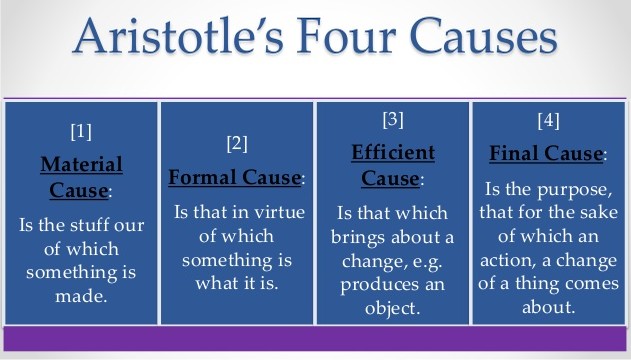
6. Time—describes a Substance in terms of some temporal situation. “The lion wakes at dawn”.
7. Position—often debated, this is not to be confused with place, and probably originally meant to indicate a Substance’s position as in sitting, standing, at rest, jumping, leaping, etc. “The lion is motionless” or the orchid is bending to the light”.
8. State—this is something about a Substance that is temporary and not necessary. “The Lion is chained”.
9. Action—describes what a Substance does to something else. “The lion is stalking/hunting/eating the gazelle”.
10. Passion or Affection—describes the emotional or affective aspects of a substance. “The lion is angry”.
Had early thinkers like Aristotle not already assumed a unity in Nature such things like Science could never have ever commenced. Darwin concludes where Aristotle’s Categories only begin. It is often ignorance of ancient views like this one, or a premature discarding of them, that appears to raise our newer thought so high, and that dares mention the word “progress” in their regard.
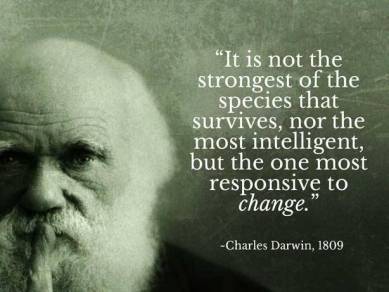
When Darwin is taken to task, nevertheless, it should not be for his “Survival of the Fittest” observation. That all species fight for survival is as close to a fact as you can get, as no plant or animal can be shown to hurry to its own demise. Plato again is poignant here, as by 300 BC or so he had already said that all beings strive for the Good. All things want to be better and want to improve, and at all costs, they want to, usually, survive. The only species I think that is an exception is Homo Sapiens. Only this one occasionally becomes suicidal and wantonly self-destructive, or put another way, self-sacrificing to the point of martyrdom, and is the preeminent bringer of novelty and genius – as well as ignorance and harm.
Plato would say that the reason people do “bad things” is because such people mistake what they are doing—in, say, suicide, for instance—for the Good, or for right thing to do. Obviously, not all reasons for such a self-destructive prospect are indefensible. To keep your loved ones from having to endure your certain helplessness and agony could be considered a good higher and greater than remaining alive. Without doubt, that we can end our own lives, or even contemplate the idea and choose not to, are both qualities which distinguish us from the other beasts. No other plant nor animal deviates from instinct like we do. But more on that later on.
This Theory of Evolution has become the accepted myth mostly because it appears to explain, well enough for the Evolutionists and their disciples in the other sciences at least, the origins of all species. But let us say now for the record, no matter the position one takes on Evolution, it makes no difference for the careful historian, who should realize Darwin concludes only where scientific thought began, and that this “latest theory” is over 2000 years old.
It is not clear to me why the earlier thinkers we have been discussing, who considered similar proposals, were discarded out of hand, while Darwin’s restatement has been not only been considered novel, but accepted. We have seen the similarities in thinkers such as the Pre-Socratic philosophers, Lavoisier, Lamarck, and others. This being so, rather than restate all of Darwin’s thought, we would probably be better served by concentrating on those aspects of Darwinism that differ from earlier thinkers.

Common Descent and the Homunculi
We can begin by repeating that no real thinker of any merit before Darwin would have doubted that all living things are somehow related. The same elements that make up the amoeba and whale make up also the lion and the orchid. In their constitutive basic parts everything alive breaks down to atomic structure. Before Darwin many theorists had already noted the commonalities among certain various species, and observed that different physical traits are held, by those species, in common. It had also already been shown by others that species can and do change to compensate for their environments or milieu and as a result of parentally-inherited tendencies.
Rather, what apparently distinguishes Darwin’s thought from his predecessors is his insistence that all species derive from a common ancestor, and so, through the course of time, the first protobiont evolved and became, eventually, the lion, and then later, Homo Sapiens. But is this claim even unique, let alone true? In Platonic terms, for instance, this consequent blurring of the lines between one living thing and the next would denote nothing more than that all things with Form have Being (to on). All things that have a form have that form by virtue of the secondary quality of Form itself; they all have the idea in common, and they all strive to be better, or evolve, and they all desire the Good (to agathon).
Suppose DNA itself to be Form, as some have said. Were this true, then genes would, and I believe, do, necessarily have built-in to themselves a plan of action, a desire, to alter their host, if not downright improve it. At this point we can stop and say “all DNA is related” in that they are alike executors of a plan, a realizations of design that I am fast coming to believe is more about the messages they carry than their structure. Regardless, all living things are related if in nothing more than their all making use of DNA, and so Darwin’s coup d’etat. Can I then say now, and gain maybe a Nobel prize, that the Earth in fact is not flat?
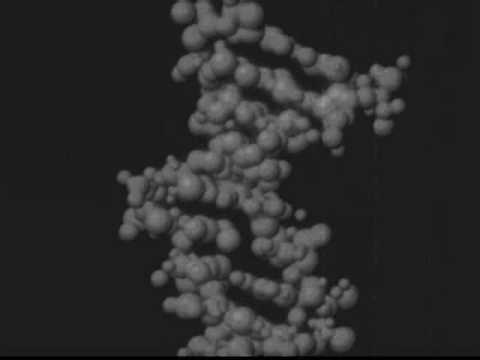
First photographed DNA chain
This point ought to be pursued further, though, because we must also assume that, if not intrinsic to the elements which comprise even one DNA chain, then from a force outside themselves, those elements must intrinsically want or desire (eros) to accumulate in a certain pattern, to bind in a certain way, to certain other elements. If we are searching for the origin of Man, the source of these tendencies has much importance. IT is what we are after. There is a world of difference between being able to predict with some accuracy and training the path or progression of, oh, Man or electricity, and understanding what electricity, or Man really is, and from whence they came.
Consider the idea of the homunculus. As time has gone by this metaphorical symbol for infinity–the never-ending ladder of Plato’s symposium, or the snake eating its own tail—was adapted in later times to account for the germinal origin of beings. These homunculi were imagined to be like little copies of the originals, for example, small ears of corn in the kernels, and little men contained within the human seed.
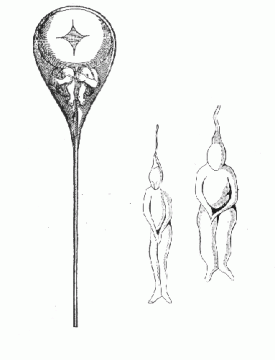
Legend has it that the originally figurative homunculi were materialized even further and were even occasionally conjured up, in the form of little omniscient men, by alchemists. And today, not to be outdone, our modern science in its psychology branch has given these little freaks new gnomish lives, demonstrating them with the usual Artist’s Conceptions to which we’ve grown accustomed:

What we care about, and the reason I have spent time on this, is the analogy, the idea of the homunculus considered like a metaphor. Imagine yourself, for instance, inside your own head, in your own mind. Now imagine this little copy of yourself with its own copy of itself inside its own head, and so on. It involves, it seems, an infinite regress. Using a mirror, we can take a photo of ourselves taking a photo of ourselves taking a photo of ourselves ad infinitum. Our true essence, in these introspective experiments, appears as an infinite regress within. Pervasive through, indeed in a sense “on top of” all this regression, there remains the unchanged observer, witnessing the thought experiment in the mind all along. There is no regress and no doubt about this observer, as nothing stands behind it to observe it. This observer is the reflector, the consciousness.
None of this either was unknown to the ancients. This is why they endeavored to distinguish practical science from ideal theory or metaphysics, and why they began to demarcate the lines between species and separate them categorically. They knew already that all plants and animals, and even things, are somehow related. What they wanted to know, is what makes them different from one another. Darwin’s proposal regarding humans, for instance, saying that we all share a common ancestor with the apes, is not a scientific proposition. It is rather a metaphysical premise, a guess just this side of wild, never mind that both his hypothesis and conclusions were just the beginning of even ancient metaphysical speculation. It is just like the theory of the homunculi.
The space-god-aliens of von Daniken, the “materializing men gaining skins” of Blavatsky, the Sons of God who came and populated the world according to Genesis, The Titans, Zeus and Chronos and Greek legends, the Mesomerican creation stories, the Sanskrit Book of Man…ALL these make metaphysical hypotheses as well, but at least they make claims more to the point of our search for the origin of Man. Our quest is not for an explanation or process of Man, nor about the changing of Man over time. We assume these things, what we want is origins, and I am afraid we must lean now in the direction of admitting that perhaps Origin of Species does not provide what it claims by any means. Maybe A Preface to the Search For the Origin of Species would have been more appropriate.
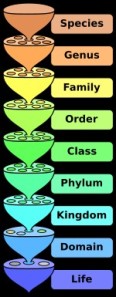
Above is a graphic (courtesy of Nature Master Encyclopedia) that illustrates the current Chain or Genera of Being as we now consider it. This effort to relate beings one to another, viz. Kingdom, Phylum, Class, Order, Family, Genus, and Species (“Life” and “Domain” are recent additions), was originally instituted by Linnaeus through studying – and more or less copying – the idea of Aristotle, and in the opinion of many it was the first significant step to doing real practical science. Indeed, it was practical science.
All this shows that way before Linnaeus, at least by 400 BC, men had already postulated the metaphysical proposition that we are, all us living things, related somehow and we could already distinguish a plant from an animal and both from a rock. We could already separate horse from antelope and antelope from corn. The Genera of Being of Aristotle had already allowed us a way to classify all those things which exist more definitely, with an eye towards precisely.
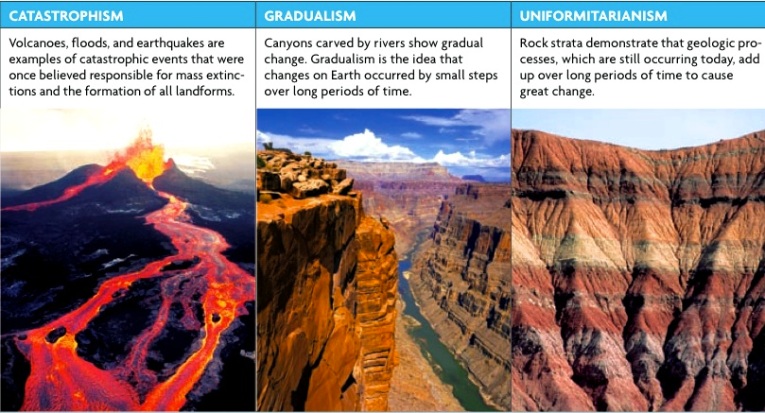
Uniformitarianism, Catastrophism, and Pangaea
As a probably unexpected result of his research on the Beagle, Darwin became considered an eminent geologist, a spokesman or “man on the street” for the then-fledgling theory of Uniformitarianism. As you will soon see, this theory is still in use today and it probably one of the most important aspects of Evolution from a geological, or as it says in that just cited article, geophysical perspective. Uniformitarianism, a bulky, ungainly word for certain, nevertheless cannot be underestimated, either in its assumptions or conclusions in support of the Theory of Evolution. The presumptions of Uniformitarianism are that there were no great cataclysms, disasters, or celestial or global catastrophes in the history of the world, at least none outside the range of those which normally occur. Consequently, the Earth always has tended, and may be expected in the future to tend, to a predictable pattern.
This “past was like the present which will be like the future” Uniformitarianist idea cites as its adversary only one real opponent, as we live our very lives every day – evolutionists, Creationists, whatever-ists, all of us – under the presumption of a somewhat predictable immediate world. Part of this understanding of how the world works, though, is that we also know very well that the odds change from event to event, and at any time. We have all seen how a 200 to 1 shot has come in and done the unexpected, as when someone survives an accident against all odds, or when great-grandma smokes a pack a day but continues to runs the roost with an iron hand at 92 years old. We never know when the exception will trump the rule, when things will not go as expected, when things will turn out differently than anticipated. Despite the odds against them happening, sometimes our computer will not boot up, our cars won’t start. Probability, while not always predictable, or even accurate, is nevertheless something very real.
Forget probability for now. The one main opponent to Uniformitarianism (I consider gradualism a type of Uniformitarianism) is Catastrophism. The theory states that, even given all the steady and predictable patterns there may normally have been, there have nevertheless also been cataclysmic natural disasters—massive floods, gargantuan earthquakes, possible collisions with celestial objects, atmospheric changes, axial shifts—and other similar planetary events which have drastically changed the “predictable” patterns assumed by Uniformitarianism. We do not yet know even the long-term effects of nuclear blasts in our own atmosphere, let alone the consequences that might result from a change in the tilt of the Earth’s axis.
Historical evidence for Catastrophism is widely found in all ancient literature and legend, and it was discussed at great length by Immanuel Velikovsky. Velikovsky aimed to prove that the devastation and general planetary havoc spoken of time and time and again in the Bible, the Koran, the Iliad and Odyssey, the Vedas, etc. were not mere legend, that these events really happened, and he had the evidence to show it. More on him later on, the point is that Catastrophism is considered an alternative to Uniformitarianism.
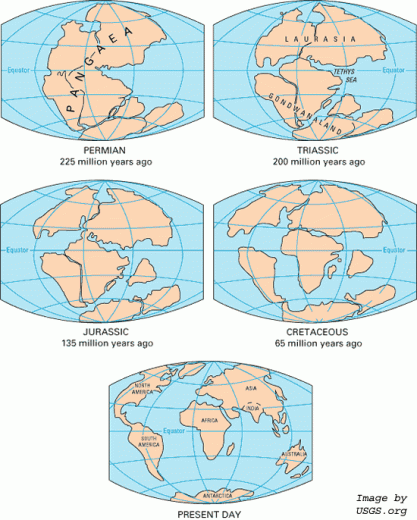
As a spokesman for Uniformitarianism or gradual change, Darwin began voicing his view that the continents of the Earth demonstrate a pattern, one which would, for example, help explain why some animals and plants found on the Galapagos are found on the west coast of South America. This geological handmaiden to Evolution we know today as the theory of the mega-continent Pangaea. The same folks who reject the evidence of an Atlantis, Mu, or Lemuria nevertheless straight-faced tell us of this giant mass which slowly cracked up, divided, and formed the continents we now know. This theory is now assumed as Truth by sciences like geology and geophysics and mostly buttressed by research about plate tectonics.
Whether true in practice or not, and some evidence in support of a current shift of the continents (which should not presume constant or historical shift) is very good if not convincing, the dating methods simply cannot give us an accurate time as to when the initial separations or cracking occurred, nor why, and these are the main issues of contention. Uniformitarianism would claim that this shift began as small rifts in the substrata millions, if not billions of years ago, and that this shift has been measurable and constant. When we are told things like “the Atlantic Ocean is receding off the coast of North America at a rate of 2 inches a year”, or that the glaciers are melting at 10% per year, these are examples of such measurable and steady rates of change. In theory it is very similar to, and probably the basis of, varve analysis, where the alternating and cumulative layering of the strata are assumed and used to date ancient artifacts and places. Catastrophism would claim the forming of these strata could have happened in a matter of minutes, the bulk of the distance between land masses established by even only one or two massive catastrophes.
Which view is correct? Or are they both correct to some degree? Applied to the origin of Man, Uniformitarianism would say that the process of human development has occurred slowly, something which lends itself very easily as support for anything like our current Theory of Evolution. From the primate came a higher primate from which came a semi-human from which came a human, all this over millions of years of adapting to the environment and genes rearranging to suit that environment. Catastrophism, on the other hand, would say that the changes from one species to the next, one genera to the next, come in giant leaps, “suddenly” as the mystics have said, caused by singularly momentous events and factors.
On thing seems clear from examining these two approaches to Earthly change, and that is Man’s origins are not necessarily found in a slow development from lesser species. We see here that he might just as well owe his uniqueness to an instant creation, a single massive mutation of existing genetic materials, or to a sudden appearance out of a virtual nowhere.
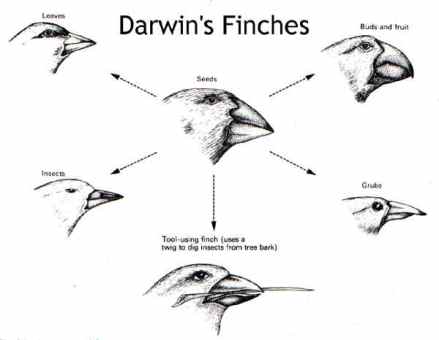
Natural Selection
Probably, some compromise is the Truth, but we cannot yet make such a determination. In his greatest work, (1859, p. 162), Darwin affirms his belief in Uniformitarianism:
Natural selection acts only by taking advantage of slight successive variations; she can never take a great and sudden leap, but must advance by short and sure, though slow steps.
Natural selection, at its best, is simply a renaming of “The Process Of Nature”. At worst this concept can be seen as very wrong. There are many semantic problems that would also need to be addressed. What is a “slight” successive variation? How do we distinguish a slight one from a massive one? What is a “great leap”, and would not any genetic change deviating from the normal degree of variation be a great leap? What is a “short step” short relative to, and with which time scale are we operating? Here we see why it is important to understand the Genera Of Being, as well as the Categories.
Consider that a few pages before the above-cited quote from the Origin of Species, Darwin had already said (p. 158):
If it could be demonstrated that any complex organ existed, which could not possibly have been formed by numerous, successive, slight modifications, my theory would absolutely break down.
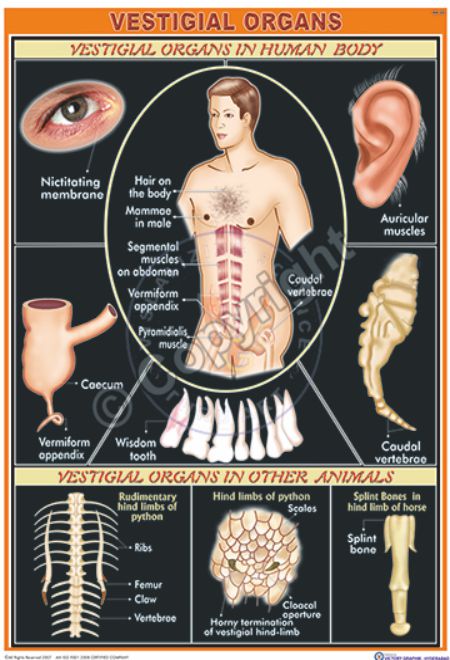
What Darwin refers to here are these days called vestigial organs. That he is plain wrong here is not hard to see. What about the Pituitary gland, for instance? The appendix? Or the rest in that graphic above? Much more importantly, if we broaden “organ” to mean “organism”, cancers of unknown origin and similar new viruses appear all the time. Moreover, from what conceivable modification did the starfish emerge, and is it not incorrect to presume, as Evolutionists do, that the tortoise’s shell is of the same origin as its toenails? By such stretches of the imagination, as that of the neck by which the giraffe, they tell us, bred its long one, we can in fact unite any two ostensibly unrelated things, no differently than we can trace everyone in Hollywood, in a few simple steps, to the actor Kevin Bacon. In truth, tracing the evolutionary path from protobiont to you is not so easy nor the method as precise as linking Madonna to Bacon.
Really, any living thing can be said to be akin to any other. In the elements and cellulose and carbon they possess, by their respiration and consuming-excreting alone there may be found many such connections. If we look at this objectively, attempting to prove “living things are all related” is as silly as it is obvious. We are all parts of Nature.
On these grounds, many of the early critics of Darwin were right to take him to task for saying little of any import. As for Darwin’s admitted qualifications of his own theory, only a very broad way of approaching the subject of kinship, and a very imaginative, even speculative understanding of descent, has kept it above water for this long. This intentional breakdown – or disregard – of the Genera of Being, for purposes of attempting to prove a general metaphysical theory, is no help at all in our quest for origins. It tells us, at best, what we already know, and at worst, absolutely nothing of significance.
There are to be found, should we push this issue, existing creatures which science is at pains to classify, even to this day. Protista, half-animal, half-vegetable creatures, strange or inexplicable animals [n.b.: that link is a fun example of many creatures but be advised many of them are common, just deformed creatures, and some manipulated images…], and even newly-discovered sea life, etc. arrive all the time. For an Evolutionist, any of these oddities can be explained away, and if one common fish scale be had by the new creature, for example, that would be seen as enough similarity to establish the descent of that creature from more common types of scaled fish. But which came first? When establishing this line of descent, how do we know? Is it not just as possible that the chimpanzee is somehow evolved out of, rather than from, Man? Does Evolution always necessarily lead to betterment, or can it sometimes lead a species to its necessary demise?
So before we move on let’s do a bit of examining of Darwin’s theory on different grounds, and assume the Truth in what he says, as we have noted, in its most positive light. Even if it is all but void of real import, it is in its best rendition a renaming of Nature, and looked at that way, hardly debatable. Let us for the moment then accept natural selection, and survival of the fittest as actually indicative of the way natural organisms get it on with the world.
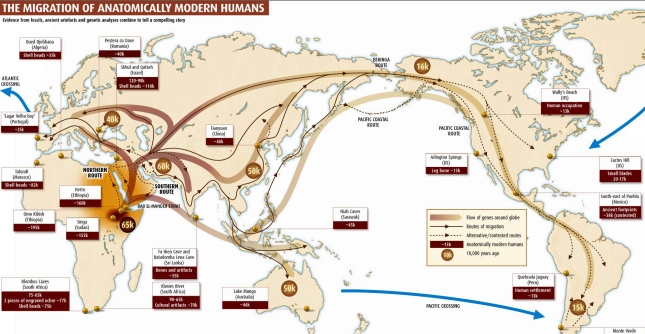
Evolving To What?
Even taking certain aspects of Evolution as a given is not enough to accept the theory, as we soon see other problems arise. Taken to its logical extremes, and given the amount of time which, we are told by the Darwinists, has elapsed since the first primordial slime, we should be fairly sure that all Life currently on the Earth ought to be similar, that all organisms should have gravitated by natural selection to be the most perfect. Most creatures should have evolved, or be evolving, to be humans, varied only slightly as a consequence of the immediate environment, as we have already mentioned. Considering Homo Sapiens in particular, it is a fact that we are spread all around the globe, that we vary as to 7 or 8 types based on skin color, stature, eye shape and color, hair type and color, etc., but we are all humans still; the often thousands of miles separating us, our different cultures and ecologies, has not affected our capability to interbreed.
By standard Evolution we can prove the influence of the environment on an existing species, but nothing more. For why, we ask again, haven’t all creatures become men? Or even tortoises, which after all have few natural enemies and live longer than humans?We must then introduce the objection that none of what Darwin wrote addresses directly the subject of the source of the mutation necessary for distinct species to come about. The diversity of species itself ought to speak against the Origin of Species as a feasible doctrine. Why hasn’t everything evolved for the best?
Without getting into something like each species’ having an innate desire to improve itself (a la Aristotle), there are several other answers Darwin could give to these questions. Every species, he could say, is limited, by which I mean it will achieve that Aristotelian entelechy and proceed to die out. It has flowered and achieved its peak of beauty and import. But then he would be simply restating Aristotle, and at the same time shooting himself in the foot, because if Evolution is correct, then why should any species die out? It should rather become stronger, through its generations weed out the detrimental qualities threatening its survival, becoming the Superspecies and dominate. If the fittest can be shown to also die out, what happens to this theory?

The Living Spirit
Finally, Darwin could answer our objections by saying that everything is but one thing, and in fact some of his other writings seem to indicate, believe it or not, a “spirit” or a “power” or “nature” which pervades and, with intelligence, guides the whole Evolutionary scheme. Here is a quote to this effect from his notebooks:
There is one living spirit, prevalent over this world … which assumes a multitude of forms according to subordinate laws. There is one thinking sensible principle allied to one kind of organic matter. [“Notebook C”, in Creativity, Psychology And the History of Science, 2005 Gruber and Bödeker, p. 142]
What is this “spirit” but “the One” of the ancients, “the Good” of the Platonists, the God of the religionists, the Logos, or the “all is One” pantheism, all of them from originating in BC times? Nothing, it is the same. Is it a wise understanding? Most certainly…but it is not Darwinism or Evolution as today understood and explained. I believe in such a principle, as I believe the maxim “as above so below”, but “new”, as an idea in any way explaining of Man’s real origin, by any stretch of definition, it is not. It need not even be indicative of progress, and even less is inquiry into it doing of any real science. This “thinking, sensible”, all pervasive “principle” of which Darwin here speaks, let me restate yet again, is a presumption of metaphysics and can at best be only an accepted premise for Science. That a guiding spirit is said to be behind Evolution is more evidence that Science has become a new religion… and one today with all the power of executive law.
Probably this is not what Darwin wanted. Probably, Darwin wanted to be a philosopher, or at least a metaphysician, rather than a scientist, as his early theological studies incline one to believe. Probably he could not separate his theory from his science, but yet he would not reject their confusion by others. In so doing, it was primarily his disciples that begat the counter-productive association of speculation with fact, setting the search for Man’s true origin back thousands of years. From Darwin on, it seems, all one had to do to prove, oh, that the moon is made of green cheese, is say that the same elements found in cheese can be found on the moon. Buon Appetit.
But all my research shows me that Darwin was a good man, and his life belies his philosophy. In this he reminds me of Bertrand Russell. Darwin opposed slavery, often refers to the One, or a guiding power behind all Evolution, and was a sincere man. His observations do aid in the quest for understanding the varieties of Life, and his theory, insofar as it is a reiteration and expansion of prior similar theorists, and as applicable to variations within species, is synonymous with adaptation and 100% correct. In a letter to Asa Gray in 1960 he sums up his own enigma:
I cannot persuade myself that a beneficent and omnipotent God would have designedly created the Ichneumonidae with the express intention of their feeding within the living bodies of caterpillars or that a cat should play with mice…I cannot anyhow be contented to view this wonderful universe, and especially the nature of man, and to conclude that everything is the result of brute force. I am inclined to look at everything as resulting from designed laws, with the details, whether good or bad, left to the working out of what we may call chance.
Darwin explains the results from his research, and I say this reluctantly, with the same confusion we began ours with here. Trying to find out the origin of Man, we too recognize the same paradoxes, and so we do this present research in effort to solve them. One could argue, this is why anyone ought to do anything scientific at all, or even any metaphysical inquiry at all. Let us then answer Darwin’s paradox, from a philosophical perspective.

Darwin And Deity
To do this we must consider what Darwin means by God. He means an omnipotent, omniscient, omnipresent deity. Darwin claims he cannot understand why such a God would create certain creatures, as if he understands already, though, God’s entire schematic. Any theory that can make the ape, as we shall see, become Man, and the aardvark the zebra, in so many steps, that cannot by the strength of the most vivid imagination, quite get at why cats like to play with mice, must be mistaken. Besides this latter assumption being a stereotyping of cats (some abhor mice, or just kill them quickly…and what about the lions…?), a generalization we should better say, are there not hundreds of possible reasons why cats like toying with mice? Maybe, sayeth God, to give the cats amusement? Maybe, sayeth God again, to amuse Darwin, watching the cats? Maybe, as instinct to play, to hone skills, even entertain themselves? Why do people who aren’t hungry bother fishing?
And what else is it that perplexes Darwin, about this God’s overseeing of the world? He is displeased, and cannot comprehend why it is that one species might feast off of another one, or we should add, off its own. But this is not difficult to explain either, as every day one sort of animal consumes another, somewhere at every moment this occurs, and for us humans, even the strictest vegetarian is right now somewhere consuming the living or once-living carcass of another living thing. But strangely, it is not this whole idea of Life consuming Life—symbolized throughout history as the serpent eating its own tail—that perplexes Darwin. It is but a few isolated events that he labels as incongruities, when he could have simply answered for them the same way he did for everything else his theory encompasses. That he did not do this regarding the Circle of Life speaks volumes on the qualifications and limits he imposes on his own theory.
Witness, then, in the quote above, where Darwin gives homage to the beautiful world it is, and furthermore appeals to designed laws which, of course, presume a Designer. We see here that, whatever his adherents have made of the theory, Darwin’s religious thought exists sure enough, and he is, by what he has written, at least a Deist, and therefore a believer, I dare say, in some sort of Creation or Creative Plan. This pre-existent schematic for the universe, and its manifestation, he acknowledges in several places. He was the grandson of Erasmus Darwin, the great freethinker, and he also attended a seminary and planned to go into the clergy. His religious background is also very evident.
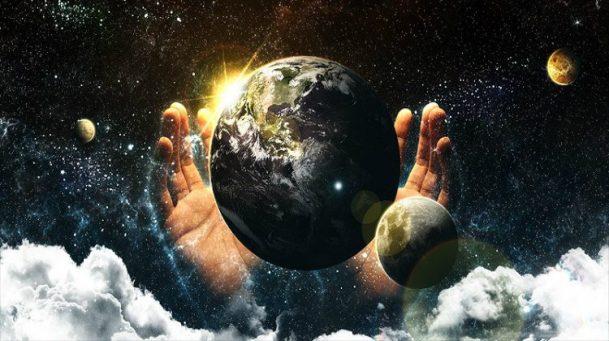
So why is his theory cited as an alternative to Creation? Most likely, as we have seen, it is no such thing. While critics might be correct in stating that Darwin rejects, for example, the Biblical claims of God creating each type of being (if not each being) individually, he cannot be shown anywhere to reject Creation as a whole. Darwin’s is an attempt to show how it is possible that from a single source (“the Spirit”) can arise the various species and varieties of species that currently grace our planet. In this aspect, this theory is old news, a repeat of ancient theory, but nevertheless correct, if but to explain how but two breeds of dogs could produce, by variations of their genes, compound breeds neither one nor the other and with their own set of distinctive traits. This could even be correct, but still, hardly rejecting of a real Creationist’s claims.
An interview with Darwin was conducted by the German magazine Spektrum. It has recently been reproduced by Scientific American here. In this interview Darwin says many interesting things. Speaking about his original plans to become a theologian, he said:
Accordingly, I read with care Pearson on the creed and a few other books on divinity; and as I did not then in the least doubt the strict and literal truth of every word in the Bible, I soon persuaded myself that our creed must be fully accepted. It never struck me how illogical it was to say that I believed in what I could not understand and what is in fact unintelligible.
What is eventually rejected by Darwin, namely Biblical doctrine, he rejects for two reasons, according to his own words and as evidenced by this interview. First, that it is illogical to say one can believe what one does not understand, and second, that it is illogical to believe what is unintelligible. But science, we know clearly, is not supposed to be grounded in belief, theories are not to be found true by belief alone. Similarly, intelligibility is also a matter relying on proof for it to make any scientific sense. Let us be clear and restate what we have been saying one final time. What is scientific, intelligible, and logical, in Darwinism, is the obviousness to which we have already alluded. No scientific breakthrough exists in this Darwinism, the logical foundations of its best dictates merely old hat in the world of metaphysical speculation, and its scientific observations merely adjustments of earlier existing observations.
It therefore appears obvious to me that the few truly novel ideas found in Darwin’s thought, that new idol placed on the pedestal by Evolution and which adherents now worship nonetheless with full submission, is a sham god, at best a bad myth and at worst a product of a vivid imagination, backed by second-rate science. He concludes his research into the origins of Man and Life where even ancient thinkers knew it ought just begin.
Enough of Darwin’s impetus. In the next section we will continue our study of the Theory of Evolution by examining the fine tunings it has endured since the idea’s first inception.




truthopia
February 17, 2009 at 10:03 pm
Yes a very good website, here is the link, I will be using information and citing it again in the coming sections:
http://www.velikovsky.info/Main_Page